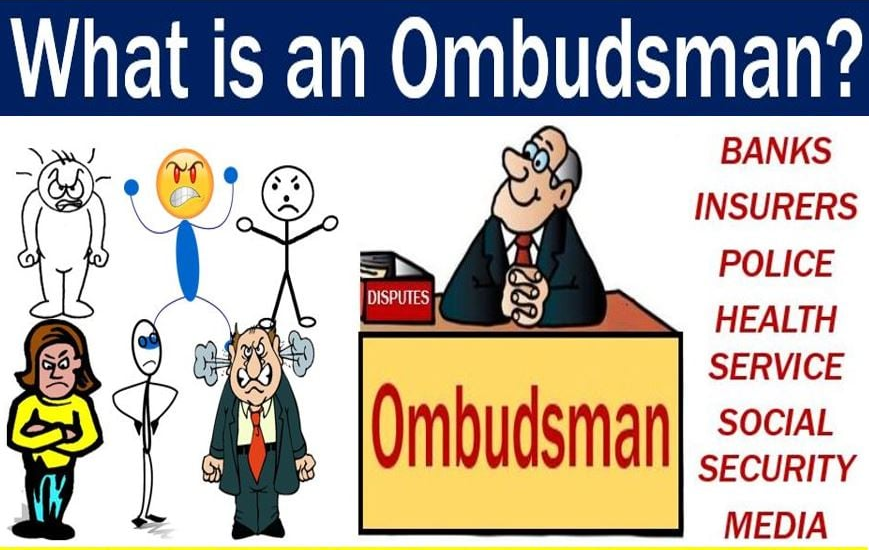In Administrative law, the Ombudsman embodies the core principles of democracy by acting as a vital check and balance on governmental power. With an unwavering dedication to justice, they safeguard the rights of citizens, uphold the rule of law, and ensure governmental accountability.
The Ombudsman serves as a guardian of individual rights, advocating for governmental transparency and driving continual improvement in state functioning. Through their diligence and commitment, they bolster the foundations of a just and equitable society.
Definition of Ombudsman in Administrative Law
An Ombudsman in administrative law is an independent official or body appointed by the government to investigate and address complaints and grievances regarding administrative actions and decisions made by government agencies, departments, or public officials.
Their primary objective is to ensure transparency, fairness, accountability, and adherence to legal and procedural standards within governmental administrative processes.
They investigate complaints against administrative actions and decisions by government agencies. Essentially, citizens can report concerns regarding governmental actions to this independent official, who ensures impartiality while working within the governmental framework.
Significance of Ombudsman in Administrative Law
The significance of the Ombudsman in administrative law lies in its role as a guardian of governmental actions and a protector of citizens’ rights. They investigate complaints alleging governmental misuse of power, inefficiency, or unfairness, wielding extensive authority, including access to government records, to provide remedies to those wronged.
The Ombudsman ensures complaints are validly addressed, possessing discretionary powers to intervene when necessary, surpassing the limitations of a Civil Court.
Read Also: Administrative Action- Meaning, Classification And Control – Short Notes
Origin of the Ombudsman Concept
The concept of the Ombudsman originated in Sweden over two hundred years ago in 1809 and gained traction across Europe in the twentieth century. Countries like Finland, Denmark, and Norway adopted similar institutions, while others, like New Zealand, utilized alternative terms such as “Parliamentary commission.”
In the UK, the creation of a body to address public grievances against governmental administration led to the appointment of a Parliamentary Commissioner in 1966, expanding to cover health matters by 1973.
India’s Lokpal inspired by the Ombudsman system.
Types of Ombudsmen
The idea of establishing an Ombudsman system in India was proposed by M.C. Setalvad in 1962. Ombudsmen can vary from inspectors general to citizen advocates, appointed at national, state, local, or municipal levels.
They may include organizational, classical, advocate, hybrid, legislative, executive, and media Ombudsmen, each addressing specific domains and issues, ensuring complaints are investigated and resolved impartially.
- Organizational Ombudsman:
- Reviews, administers, and investigates complaints within public or private sector organizations.
- Ensures proper resolution of issues and communicates conflicts within the organization.
- Classical Ombudsman:
- Appointed by the government to address public grievances concerning authorities or governmental actions.
- Has the authority to review complaints and take appropriate actions to resolve them.
- Advocate Ombudsman:
- Works in both public and private sectors, advocating for persecuted individuals or groups.
- Focuses on defending individuals against unfair policies and practices of government entities or organizations.
- Hybrid Ombudsman:
- Investigates complaints from both private and public sectors.
- Conducts investigations independently and produces annual reports on findings.
- Legislative Ombudsman:
- Addresses issues and disputes faced by the public concerning government agencies and branches.
- Emphasizes government policies and legislation, proposing changes based on public demands.
- Executive Ombudsman:
- Assesses complaints and failures in government conduct involving government officers and authorities.
- Issues public reports for reference and collaborates with officials to improve government operations.
- Media Ombudsman:
- Investigates complaints within news organizations and media outlets.
- Handles issues such as false news, misleading advertisements, and inappropriate media-customer relations, ensuring fair resolution of conflicts.
Powers and Functions of Ombudsman in Administrative Law
They possess discretionary powers to address corruption, negligence, and inefficiency, varying in authority across different jurisdictions.
- Safeguarding citizens’ rights and freedoms.
- Supervising general civil administration.
- Investigating cases of corruption and misconduct.
- Exercising discretionary powers to address various issues.
In India, the establishment of Lokpal and Lokayuktas under the Lokpal Act of 2013 aims to combat corruption at the national and state levels, with powers to investigate and prosecute corrupt public servants.
Conclusion
- Ombudsman’s role crucial for upholding transparency, fairness, and accountability in government.
- Functions include mediating disputes, conducting investigations, and recommending improvements.
- Helps enhance administrative processes and reduce conflicts in the future.
What is Definition and Purpose of Ombudsman?
The Ombudsman in administrative law acts as a check on governmental power, ensuring justice and accountability. They investigate complaints against administrative actions and decisions by government agencies. Read More.
What’s the Origin of Ombudsman?
Originated in Sweden in 1809; adopted by other European countries in the 20th century. Britain established the Parliamentary Commissioner in the 1960s.
Types of Ombudsmen – Short Notes
Organisational, Classical, Advocate, Hybrid, Legislative, Executive, and Media Ombudsmen. Each type focuses on different domains and issues, ensuring fair resolution of conflicts. Read in Detail



